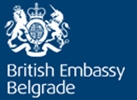Thomas Lubeck, Regional Manager at International Finance Corporation (IFC) – We are improving the business environment in Serbia, micro, small and medium companies to benefit the most
 Wednesday, 26.09.2018.
Wednesday, 26.09.2018.
 15:42
15:42

eKapija: The Project for Improvement of Investment Climate in Serbia is being implemented since this January. What has been your main impression so far? Have you been pleasantly surprised by anything or disappointed with something? Is there progress?
– I can honestly say that the project's progress has exceeded my expectations. We have full support from the Government of Serbia, the Secretariat for Public Policies and the Office for IT and eGovernment, the competent ministries, agencies and other organs, with which we have been working together for eight months now on the process of reducing the administrative burden of the Serbian economy.
Considering that the project aims to simplify as many as 1,750 administrative procedures for obtaining various licenses, permits and authorizations the economy needs every day, as well as to enable the electronic issuing of as many as 100 permits, micro, small and medium companies, which make up 99.5% of the total number of companies, and of course, the citizens of Serbia and the state budget, stand to benefit the most.
Because of that, the project entails consultations with the economy, sector associations and other business organizations and experts to the end of finding applicable and optimal solutions in terms of efficiency. In cooperation with the Chamber of Commerce of Serbia, the NALED and the Association of Business Women in Serbia, a range of focus groups have been organized within the project, where we talked to around 250 companies, micro, small and medium enterprises, about the ways of simplifying the procedures they encounter every day in their operations.
We are in the final phase of analyzing and preparing the recommendations for the simplification of 600 permits, licenses and authorizations, and their issuing will have been accelerated by mid-2019.
eKapija: Would you highlight any state institution or professional association in Serbia as especially successful in making results in the digitization, in the simplification of administrative procedures and in the facilitation of the business conditions?
– In several months, our project will come out with concrete propositions for simplifying the procedures and amending the regulations, as well as for choosing the procedures for the digitization, which we are very close to.
However, there are already some good examples that should be commended. There's company registration at the Business Registers Agency (all services in one place), the issuing of building permits, but also the “Welcome to the World” project, which enables the electronic registration of the baby's name, the place of residence, health insurance and citizenship at the hospital.
In any case, in the next month and a half, we will have a list of simplified procedures, as well as 100 procedures to be digitized.
eKapija: One of the project's goals is to remove the practices which negatively impact the development of competition. Which practices of this kind have you noticed in Serbia? To what extent is there healthy competition in the local market? Would you emphasize any industry positively or negatively in this respect?
– We are currently in the stage of a detailed analysis of sectors, the kind of which has not been done yet. We are, of course, working in cooperation with the Commission for Protection of Competition and the relevant ministries. In a few months, the analyses will be ready and we will have agreed on the sectors in which the existing barriers will be removed.
eKapija: What kind of effects from this project can companies in Serbia expect? Will they have more money for investments?
– Precisely! The simplification of administrative procedures and their digitization certainly save time and money for entrepreneurs in Serbia. Our analysis of 1,750 administrative procedures includes a calculation of the costs of their execution and we will soon know how much these savings will amount to exactly. Another factor that will influence the choice of the procedures is which procedures the economy of Serbia spends the most resources on, and their optimization will be the priority.
eKapija: What kind of information do you get from Serbian companies? What do they complain of?
– If I need to emphasize the biggest problem for the economy in this field, it is that it often needs to take the role of a messenger between state organs, going from office to office with papers that the state organs in the service of citizens and the economy should, without any doubt, provide themselves.
eKapija: Would you agree with the thesis that increasing the efficiency could be the driving engine of the development and the economic growth of Serbia?
– Absolutely! The efficiency of state institutions and a predictable and stable business environment are crucial to attracting domestic and foreign investments. With the ongoing administration reform, Serbia is well on its way to becoming even more attractive, which means more investments, more employees and a higher standard for citizens in Serbia.
eKapija: Digitization, which includes the presented goal of electronic issuing of 100 permits, is without a doubt important to the improvement of the business environment. Everybody is talking about the digitization, but do you recognize any other factors of the business environment that need to be improved, more precisely, the terms of financing, the legal framework, the state of the infrastructure (roads, railways, waterways), telecommunications, tax policy etc? Is digitization the top priority of Serbian developmental policy with good reason?
– In Serbia, the digitization is without a doubt the biggest opportunity for the country to become more competitive and efficient and to have a faster and more sustainable economic growth. At the same time, the digitization and eGovernment are powerful tools in countering corruption. Without any doubt, then, digitization is one of the Government's top priorities.
On the other hand, there is still room for improving the business environment through the said regulatory reform, the regulation of parafiscal charges, public procurement procedures, relaxing foreign exchange regulations, investments in infrastructure, so that the further growth of the economy and the creation of new jobs would be stimulated.
eKapija: As the Regional Manager for Central and South-East Europe at the IFC, could you compare the business environment in Serbia with the business environment in other countries of the region?
– There is no doubt that Serbia is recording a positive trend and I am optimistic that, as you progress in the process of accession tot he EU, the situation in various fields will be getting better and better. This includes the conditions for the development of the economy and, most importantly, in the everyday standard of living, which each citizen of Serbia can feel.
That my optimism is justified is shown by the progress made on the Doing Business List of the World Bank Group. Let me remind that, according to the latest report, from 2017, Serbia is 43rd in the ease of doing business, compared to the 47th spot from a year before, whereas, at the same time, it jumped to the 10th spot among 190 countries on the list when it comes to the issuing of building permits.
As the project moves forward, I believe that there will be more good news for local and foreign investors in Serbia.
Mirko Radonjic
 IFC
IFC
 Svetska Banka-WB Beograd
Svetska Banka-WB Beograd
 Ambasada Velike Britanije Beograd
Ambasada Velike Britanije Beograd
 Vlada Republike Srbije
Vlada Republike Srbije
 Kancelarija za informacione tehnologije i elektronsku upravu
Kancelarija za informacione tehnologije i elektronsku upravu
 Agencija za privredne registre
Agencija za privredne registre
 Privredna komora Srbije
Privredna komora Srbije
 NALED
NALED
Most Important News
06.04.2024. | Agriculture
Preconditions for Placement of Fresh Blueberries and Dried Plums in Chinese Market Secured

16.04.2024. | News
Jovan Ciric, Leasing Director Retail MPC Properties – MPC Echo symbolizes our desire for good ideas and innovative endeavors to spread freely and bring about positive changes

16.04.2024. | News
10.04.2024. | Finance, IT, Telecommunications, Tourism, Sports, Culture
Creative Industry – What This Serbian Economy Sector Worth EUR 2 Billion Encompasses

10.04.2024. | Finance, IT, Telecommunications, Tourism, Sports, Culture
18.04.2024. | Industry, Finance
Here come the new hunters for Serbian gold – Australian Strickland Metals buys mining project on mountain Rogozna

18.04.2024. | Industry, Finance
16.04.2024. | News
Economy Fair in Mostar opens – 26 companies from Serbia exhibiting

16.04.2024. | News
18.04.2024. | Transport
Jovanovic: Purchase of Siemens trams produced in Kragujevac for GSP Beograd should be considered

18.04.2024. | Transport


 Izdanje Srbija
Izdanje Srbija Serbische Ausgabe
Serbische Ausgabe Izdanje BiH
Izdanje BiH Izdanje Crna Gora
Izdanje Crna Gora


 News
News






